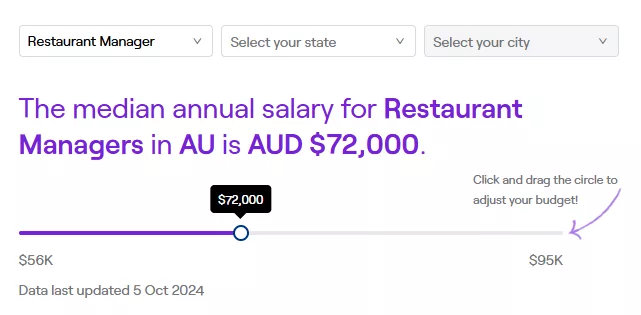Restaurant Manager Job Description: Duties, Skills, & Responsibilities
Access a personalised barista job description detailing skills, salary expectations and key responsibilities.

Looking to hire a restaurant manager? Understanding the responsibilities of the role you’re hiring for is an important part of the recruitment journey. When hiring for a restaurant manager, it’s essential to outline a clear list of responsibilities that support restaurant operations, drive customer satisfaction, and ensure compliance with health and safety regulations.
Your ideal candidate should confidently manage day-to-day restaurant management tasks such as overseeing staff, rostering, customer service, budgets, and maintaining a smooth front-of-house and back-of-house. A good restaurant manager will lead their team, ensure compliance with industry regulations, and contribute to a welcoming dining environment.
Restaurant manager job duties and responsibilities
In the hospitality industry, delivering excellent customer service is one of the most essential parts of the role. A restaurant manager is expected to greet guests, ensure a positive dining experience and oversee front and back-of-house operations. They will also be expected to respond to customer complaints and resolve issues, monitor employee performance and provide coaching and feedback.
As a managerial role, a restaurant manager will be responsible for ensuring adherence to health and safety regulations. Staying on top of compliance will be a key part of the role, along with ensuring the restaurant is set up to run smoothly week to week. This would include managing stock levels, ordering supplies, and liaising with vendors.
Team management is another key part of the role, which will include overseeing shift schedules, rosters, and payroll administration. Ultimately, a restaurant manager will need to uphold company standards and drive customer satisfaction. An experienced restaurant manager should be proactive, organised, and solutions-focused.

What should be included in a restaurant manager job description?
A restaurant manager job listing should outline key responsibilities such as managing staff, ensuring service standards, handling customer concerns, and staying on top of inventory and budgets.
It should also include desirable attributes such as strong management skills, clear communication, leadership qualities, and a solid understanding of hospitality management. Experience with restaurant management software, rostering tools, and POS systems can also be beneficial.
You may also wish to include any necessary qualifications, such as a Certificate IV in Hospitality, RSA accreditation, and food safety training. Familiarity with local council and state health and safety regulations is highly desirable.
Example of a job description
We are seeking a highly motivated Restaurant Manager to join our team. The ideal candidate will have strong leadership skills, a customer-first mindset, and a passion for delivering top-tier service in a fast-paced hospitality environment.
Responsibilities:
- Supervise daily restaurant operations
- Provide excellent customer service and resolve complaints
- Train, schedule, and support restaurant staff
- Monitor food quality and service delivery
- Manage inventory and supplier relationships
- Ensure compliance with health and safety standards
- Track expenses, monitor budgets, and reduce costs
- Use restaurant management software for reporting and analytics
- Lead by example and promote a positive work environment
- Handle administrative tasks such as rosters, payroll, and ordering
Qualifications:
- Relevant qualification in hospitality management or equivalent experience
- Proven track record as an experienced restaurant manager
- Exceptional leadership and communication skills
- Strong organisational and management skills
- Competency with POS systems and back-end restaurant management software
- Understanding of workplace health and safety and food hygiene
- Ability to handle high-pressure situations and solve problems quickly
- Passion for delivering excellent customer service

What is the best way to screen candidates?
To identify a good restaurant manager, look for both hard and soft skills. Review CVs for relevant industry experience and conduct interviews to evaluate their leadership style, team management skills, and their approach to customer service. Reference checks are also a core step to ensure a candidate has been successful in similar roles.Practical assessments or trial shifts can also offer insight into their ability to lead a team, handle customer complaints, and manage busy service periods. For a less manual approach, using platforms like Employment Hero can help find qualified candidates by matching them with your specific job requirements. With our SmartMatch tool to streamline the process of pre-screening candidates for you, you can ensure they have the right experience, food safety training, and are local to your area before jumping into interviews. This way, there’s no need for a lengthy job description, as the system already matches candidates based on their qualifications and experience.
Employment Hero comes preloaded with millions of active job seekers, ready and waiting. No job ads needed.
 |  |  |
| Instant matches, no waiting Skip the job ads. Every role gets a live shortlist of quality candidates, instantly matched from a network of over 1 million active job seekers. | Cut costs, hire smarter Reduce recruitment spend and time-to-hire by up to two weeks. With candidates built in, there’s no need for costly ads or long delays. | From sourcing to onboarding SmartMatch handles the entire hiring journey: sourcing, shortlisting, and onboarding—so you can focus on growing your team, not managing the process. |
What skills should a restaurant manager have?
A successful restaurant manager needs a combination of leadership and operational skills, including strong communication, team supervision, and decision-making abilities. As part of the restaurant manager’s duties, they are responsible for ensuring smooth daily operations, managing staff performance, and handling customer concerns effectively.
Restaurant managers work closely with both front and back-of-house teams to maintain service quality and efficiency. To thrive in the role, they must demonstrate excellent customer service skills, creating a welcoming environment that enhances guest satisfaction and loyalty. Overall, a restaurant manager job description should outline skills such as:
- Proficiency in customer service
- Excellent verbal and written communication
- Experience in managing budgets
- Knowledge of restaurant operations
- Experience in team leadership and managing employees
- Understanding time management and scheduling
- The ability to handle customer complaints with excellent conflict resolution skills
- Be tech savvy with restaurant management software
- Good attention to detail and commitment to workplace safety
What qualifications should a restaurant manager have?
While not all employers require a formal degree, many prefer candidates with qualifications in hospitality management, business, or related fields. Certifications in food safety, RSA, and first-aid are also valuable.

What are restaurant manager salary expectations?
Restaurant manager salaries vary based on experience, location, and business size. Offering a competitive salary is key to attracting and retaining skilled candidates in a competitive market. If you’re looking to determine what you should be paying staff based on your industry, location, and role, jump into our calculator below.

Should a restaurant manager be required to have any specific education or training?
While hands-on experience is essential, employers typically prefer candidates with a mix of on-the-job experience and relevant formal training. This can include a Certificate or Diploma in hospitality management, RSA and food handling certification, training in health and safety regulations, and familiarity with restaurant management software.
Should a restaurant manager be required to have any specific experience?
While some venues hire entry-level managers and train them internally, many employers seek candidates with previous experience in restaurant management, team leadership, or customer service roles. Experience helps managers adapt quickly and contribute effectively to the team and venue’s performance.
Frequently Asked Questions about restaurant managers
What daily duties and tasks will a restaurant manager complete?
A restaurant manager oversees daily operations, including welcoming customers, managing bookings, and resolving issues. They supervise staff and food preparation, handle rostering and inventory, ensure compliance with health and safety standards, and track sales and budget performance.
How can a business attract the best candidate for their open role?
To attract top restaurant managers, offer competitive pay and benefits, professional development opportunities, a supportive team culture, clear expectations with training pathways, and strong visibility of your brand values and workplace culture. Using platforms like SmartMatch can help find the right talent quicker.
Is there a difference between a restaurant manager and a general manager?
Yes. A restaurant manager typically oversees a single venue, focusing on daily operations, customer service, and staff management. A restaurant general manager may manage multiple venues or have broader responsibilities including strategy, marketing, and higher-level budgeting
























